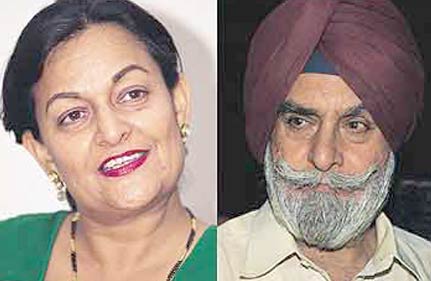Rupan Deol Bajaj, a senior IAS officer, was the first woman to take a case of sexual harassment to the court in India. Her harasser was “Supercop” KPS Gill, who recently passed away. Newspapers ran pages and pages of accolades for Mr Gill, all conveniently ignoring his conviction for sexual harassment in 2005.

Headlines following the death of KPS GIll all conveniently forgetting his history of sexual harassment. Taken from Scroll, Indian Express and Times of India (top to bottom)
While it might be one perspective that women at the highest positions of the bureaucracy are immune from the general drudgery of the Indian legal system, retired senior IAS officer Rupan Deol Bajaj argues that the institutional exploitation is as casual even for women who comprise the topmost gentry.
Watch: Rupan Deol Bajaj’s interview with BBC
She emphasizes that a woman could be at any position but she still remains a woman. Her story is both of courage and despair. However the bottomline remains that she refused to give up and fought for her dignity till she regained it. On one hand it was a restoration of dignity and justice for Bajaj, on the other hand it was also pivotal in framing of jurisprudence on outraging the modesty of women under the Indian Penal Code, 1860.
Something rather unusual happened in the July of 1988. A high profile case was lodged with the police under the dormant sections 354 (assault or criminal force to a woman with intent to outrage her modesty) and 509 (word, gesture or act intended to insult the modesty of a woman) of the Indian Penal Code, 1860. It was a unique case with no precedent.
Bajaj’s case was pivotal in framing of jurisprudence on outraging the modesty of women under the Indian Penal Code.
As the story goes – Ms Bajaj and her husband, both senior IAS officers, went to a dinner party at one of their colleagues’ place where the hero cop of Punjab insurgency, the Director General of Police, KPS Gill was also present. Now, as was the norm back in the eighties, men and women sat separately in respective semi-circles facing each other.
All of a sudden KPS Gill, unacquainted with the concepts of decency and consent, came to Ms Bajaj’s seat and put up a finger on her face ordering her to come along. She told him that he was misbehaving but only if he could hear the warning. She stood up to leave and then he slapped on her posterior. All the guests were shocked but Ms Bajaj was traumatised. And then she realized that the only way of leading a respectable life was to fight against the society where violation of dignity of women was casual.
Thus she filed an FIR with the police. Of course no investigation took place. She then approached the Judicial Magistrate who ordered the investigation and against these complaints Mr Gill approached the High Court. The High Court quashed the complaints because the Honourable Court thought that it was a trivial offence under Section 95 of the Indian Penal Code not worthy of any prosecution. Woman’s dignity, always trivial.
The court also said the offence was unnatural and improbable. What?! Anyway, despite these very interesting observations by the High Court, Mrs. Bajaj decided to take the matter to Supreme Court. But she had already lost hope now. Then something extraordinary happened.
The Supreme Court overturned the decision of the lower Court and ruled that the offence of outraging the modesty of women was committed under Sections 354 and 509 of the Indian Penal Code. The problem that occurred was regarding the definition of modesty.
The Apex Court referred to various dictionaries where modesty was defined as ‘womanly propriety of behaviour; scrupulous chastity of thought, speech and conduct’ and ‘decorous in manner and conduct; not forward or lewd; shamefast’.
Another important case that was referred was State of Punjab v. Major Singh where the accused had fingered a seven and a half month old child and the question was whether she possessed modesty. Here the court held that any act done committed on women which is suggestive of sex would fall under the definition of modesty.
Thus the ultimate test for ascertaining whether modesty has been outraged is, is the action of the offender such as could be perceived as one which is capable of shocking the sense of decency of a woman. Thus, in the instant case, because slapping on the posterior has sexual overtones, it clearly falls under the mischief of section 354 of the Indian Penal Code.
Bajaj was the first woman to take a case of sexual harassment to the court in India – and then she won it.
The Supreme Court thus ordered the lower court to dispose of the case as per the procedure prescribed by law. Thus, Mr Gill was convicted in 2005 after seventeen years of the commission of the offence. He was awarded the imprisonment of three months and a fine of Rs. 2,00,000. Ms Bajaj refused to take the compensation as it cannot recompense her for the ignominy and the trauma she underwent for so much for her life. The imprisonment was subsequently converted into probation.
Mr Gill was awarded Padma Shri in 1989. Our society has certain criteria for greatness and being a respecter of the rights of their fellow beings is definitely not one of them.
Ms Bajaj, now retired, recalls her struggle as to how the drawing room discussions were around why a woman would trouble a man for this stature for such a trivial thing. Outraging the modesty of women is one of the most forgivable and forgettable offences in India. Women, be afraid for your modesty, not everyone can keep the courage living for seventeen years. Also rest in peace, Mr KPS Gill!





Well written
Since when it’s happening that “Outraging the modesty of women is most forgivable and forgettable thing in India” , seriously ?